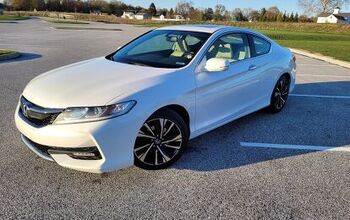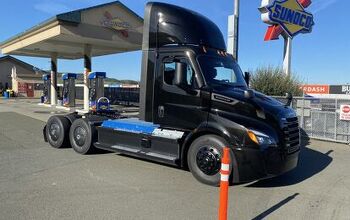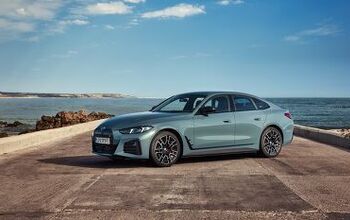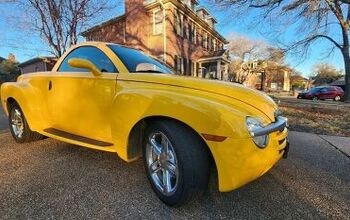Nissan Prepares to Rejoin the Competition With Next Wave of Electric Vehicles

Consumer demand may be the driving force behind automakers shifting assembly line production toward crossover vehicles, but there is another trend that has nothing to do with modern-day sales. Electric vehicles have a small but loyal consumer base and the majority of carmakers seem poised to ensure the next decade caters directly to them — whether it be through pure BEVs or hybridized powertrains.
However, not every manufacturer has its electrified ducks in a row. Despite hitting its mark with the Leaf EV, Nissan has been resting on its laurels since 2010 and hasn’t made the same sort of technological promises that Volkswagen Group or Ford cannot help but keep repeating… over and over again. Nissan’s chief planning officer Philippe Klein even admitted in January that his company’s EV prospects are dim and something needs to be done.
“Five or six years ago, we were looked at as a kind of adventurous company, moving into an area where nobody was expecting us to move,” Klein told Automotive News. “And now you have a lot of players making big announcements, and we are looked at like laggards.”
Fortunately, Nissan’s new CEO Hiroto Saikawa says the business has started taking steps to ensure it is not left behind in the next decade — starting with the alleviation of range anxiety. Saikawa says automakers, including Nissan, should have something to calm Leaf owners’ nerves before 2020. However, he admitted that may only apply to customers in Japan and Europe, who usually put fewer miles on the odometer.
When we asked Nissan to confirm whether or not the next-generation Leaf would make it to North America, it responded with, “As a matter of policy, we do not discuss future product plans.”
However, we have it on good authority that the Leaf will continue to persist in Canada and the United States. It just might not possess the range required to appease our vehicular sensibilities. But Saikawa says something electric is coming with a range above 300 miles within the next couple of years — and it should be joined by an array of hybrid and all-electric models between 2020 and 2025.
“The real evolution will come when we have a serious plan for the substitution of existing powertrains, say in our major models: the Rogue, Qashqai, X-Trail. A major part of it will be EV. This is the time I’m talking about. Maybe 2025,” Saikawa explained.
“But the period of differentiating ourselves by technology is almost over. Then, [it] will be a competition of how aggressively you can deploy the portfolio across the models. We would like to be on the aggressive side, the leading side.”
[Image: Nissan]

A staunch consumer advocate tracking industry trends and regulation. Before joining TTAC, Matt spent a decade working for marketing and research firms based in NYC. Clients included several of the world’s largest automakers, global tire brands, and aftermarket part suppliers. Dissatisfied with the corporate world and resentful of having to wear suits everyday, he pivoted to writing about cars. Since then, that man has become an ardent supporter of the right-to-repair movement, been interviewed on the auto industry by national radio broadcasts, driven more rental cars than anyone ever should, participated in amateur rallying events, and received the requisite minimum training as sanctioned by the SCCA. Handy with a wrench, Matt grew up surrounded by Detroit auto workers and managed to get a pizza delivery job before he was legally eligible. He later found himself driving box trucks through Manhattan, guaranteeing future sympathy for actual truckers. He continues to conduct research pertaining to the automotive sector as an independent contractor and has since moved back to his native Michigan, closer to where the cars are born. A contrarian, Matt claims to prefer understeer — stating that front and all-wheel drive vehicles cater best to his driving style.
More by Matt Posky
Latest Car Reviews
Read moreLatest Product Reviews
Read moreRecent Comments
- Jeff One less option will be available for an affordable midsize sedan. Not much can be done about GM discontinuing the Malibu. GM, Ford, and Stellantis have been discontinuing cars for the most part to focus on pickups, crossovers, and suvs. Many buyers that don't want trucks or truck like vehicles have moved onto Japanese and South Korean brands. Meanwhile large pickups and suvs continue to pile up on dealer lots with some dealers still adding market adjustments to the stickers. Even Toyota dealers have growing inventories of Tundras and Tacomas.
- Lorenzo This car would have sold better if there was a kit to put fiberglass toast slices on the roof.
- Lorenzo The Malibu is close to what the 1955 Bel Air was, but 6 inches shorter in height, and 3 inches shorter in wheelbase, the former making it much more difficult to get into or out of. Grandma has to sit in front (groan) and she'll still have trouble getting in and out.The '55s had long options lists, but didn't include a 91 cubic inch four with a turbo, or a continuously variable transmission. Metal and decent fabric were replaced by cheap plastic too. The 1955 price was $1765 base, or $20,600 adjusted for inflation, but could be optioned up to $3,000 +/-, or $36,000, so in the same ballpark.The fuel economy, handling, and reliability are improved, but that's about it. Other than the fact that it means one fewer sedan available, there's no reason to be sorry it's being discontinued. Put the 1955 body on it and it'll sell like hotcakes, though.
- Calrson Fan We are already seeing multiple manufacturers steering away from EVs to Hybrids & PHEVs. Suspect the market will follow. Battery tech isn't anywhere close to where it needs to be for EV's to replace ICE's. Neither is the electrical grid or charging infrastructure. PHEV's still have the drawback that if you can't charge at home your not a potential customer. I've heard stories of people with Volts that never charge them but that's a unique kind of stupidity. If you can't or don't want to charge your PHEV then just get a hybrid.
- AZFelix The last time I missed the Malibu was when one swerved into my lane and I had to brake hard to avoid a collision. 1 out of 5⭐️. Do not recommend.


































Comments
Join the conversation
Would anyone get excited if Nissan announced a new gasoline 50 mpg commuter car with a 4 gallon tank, a refueling nozzle the diameter of a drinking straw, and a weak heater and A/C unit that cut range by 1/3 if they are actually used in hot or cold weather?
I do believe that given the current state of battery technology and driving conditions in the U. S., that the PHEV is a better choice than an BEV for most drivers. Having driven one for the last three years has made me a believer. Once you do your in-town driving in an EV, it's tough to go back.